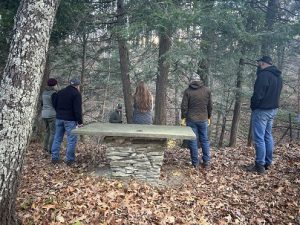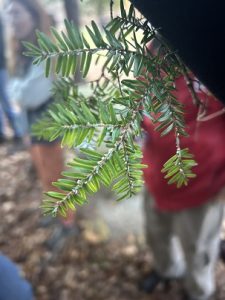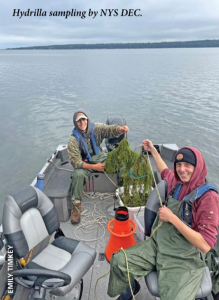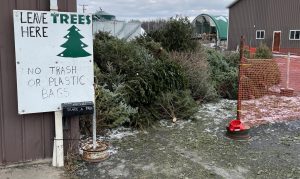Isaac Walker Watershed Manager, Cayuga Lake Watershed Intermunicipal Organization
Recently, the Cayuga Lake Watershed Intermunicipal Organization (CWIO) assisted the Finger Lakes Partnerships for Regional Invasive Species Management (FL-PRISM) and NY State Parks on a project to treat Hemlock Wooly Adelgid (HWA), a non-native invasive insect that can harm and eventually kill hemlock trees (Tsuga canadensis).
The project focused on areas within 25 feet of streams in four state parks, Buttermilk Falls, Robert H. Treman, Fillmore Glen, and Watkins Glen. Roughly 1000 trees were treated with insecticide. This treatment of trees in riparian areas is key to continuing watershed health. Hemlock trees provide shade that is essential in keeping stream temperatures cool enough for many trout species. In addition to shade, these trees provide stabilization of the steep banks found in many of these parks.
The culmination of the project was an educational site visit to Buttermilk Falls on November 7th, hosted by CWIO Watershed Manager, Isaac Walker. The visit provided watershed groups, municipalities and other partners the opportunity to ask questions of the contractor that did the treatment, AMRO Forestry. Artem Treyger, Executive Vice President of AMRO, was able to answer questions about cost, what type of trees are eligible for treatment, and the different types of treatment available. This information was valuable for the lake associations in attendance, many of whom are interested in treating HWA on private land. This treatment is also useful for municipalities who are actively using it in parks and open spaces. Artem also gave a demonstration of the ArborJet insecticide treatment system, which was used on this project.
Public participation and further information
Public participation is a key component of HWA management, in addition to treatment. A useful source of HWA information and advice is the New York State Hemlock Initiative https://blogs.cornell. edu/nyshemlockinitiative/, a Cornell University project that researches the Integrated Pest Management and Biological Control of HWA. NYSHI works with scientists, natural resource management professionals, and New York residents that are united in their love for hemlock trees and their dedication to hemlock conservation.
Disclaimer: Reference to any specific commercial products, services, or companies does not constitute endorsement or recommendation by Cayuga County. This content is intended solely for informational purposes and does not imply promotion or support of any private business interests.
Hemlock Woolly Adelgid




